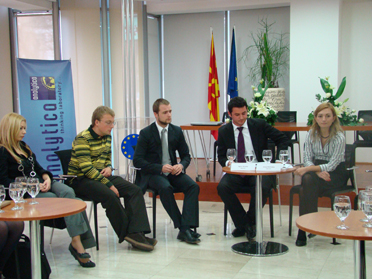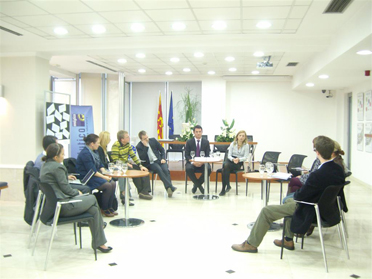Skopje, 21st of October 2009 Roundtable “Four Years from the Candidacy Status: what has been done and what to expect?”
 On 21st of October 2009, Analytica organized a Roundtable discussion in the EU InfoCentre in Skopje following the latest report from the EU Approximation and Integration Advocacy Programme: “Four Years from the Candidacy Status: what has been done and what to expect?” The participants at the Roundtable were representatives of the civil society sector in Macedonia and the media. Analytica’s main goal was to engage the civil sector into the EU integration process more actively by organizing events and activities of this kind, and raise issues of critical importance as the EU integration process takes another leap after the 2009 Progress report with positive recommendation by the EC.
On 21st of October 2009, Analytica organized a Roundtable discussion in the EU InfoCentre in Skopje following the latest report from the EU Approximation and Integration Advocacy Programme: “Four Years from the Candidacy Status: what has been done and what to expect?” The participants at the Roundtable were representatives of the civil society sector in Macedonia and the media. Analytica’s main goal was to engage the civil sector into the EU integration process more actively by organizing events and activities of this kind, and raise issues of critical importance as the EU integration process takes another leap after the 2009 Progress report with positive recommendation by the EC. On 21st of October 2009, Analytica organized a Roundtable discussion in the EU InfoCentre in Skopje following the latest report from the EU Approximation and Integration Advocacy Programme: “Four Years from the Candidacy Status: what has been done and what to expect?” The participants at the Roundtable were representatives of the civil society sector in Macedonia and the media. Analytica’s main goal was to engage the civil sector into the EU integration process more actively by organizing events and activities of this kind, and raise issues of critical importance as the EU integration process takes another leap after the 2009 Progress report with positive recommendation by the EC.
The overall conclusions from the discussion were that in order for Macedonia to get a green light for starting the negotiations for full EU membership in December 2009 it needs to show good will in the name dispute with Greece. Other topic of the discussion was the reform process in the country and how much is the Government ready to start the negotiations. The overall conclusion was that most of the problems from last year have remained. There is still no strategy created for this process although the authorities believe that they are performing very well and assigned the success of the visa liberalization process and the positive EC report entirely as their achievements. The misconception in the public over the responsibility ownership of the EU integration process was stressed as another big issue that needs urgent attention, as only informed public can be of an active support. The discussion touched upon issues of the public administration reform process. Here it was concluded that there is still no autonomous and independent public administration yet.
The overall number of employees in the PA is more than sustainable as it is also noted in the 2009 Progress Report and there is still unprofessionalism and spoils-based employments. The participants concluded that the most difficult part is yet to come and that there must be bigger pressure from the civil sector on the government regarding its involvement in the reform process. It was recommended that the government should include the civil society in reshaping the NPA as a vital document in the approximation process. The participants agreed that research organizations should strengthen the cooperation among them and with the Sector for EU integration, and contribute to moving forward the negotiation process as much as they can.
 |
 |

